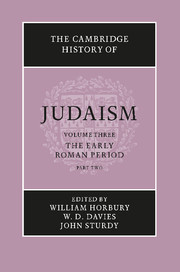Book contents
- Frontmatter
- 1 The archaeology of Palestine 63 bce–ce 70
- 2 The Herodian Temple
- 3 Recent archaeology in Palestine: achievements and future goals
- 4 The contribution of Jewish inscriptions to the study of Judaism
- 5 The social, economic and political history of Palestine 63 bce–ce 70
- 6 The Diaspora in the Roman period before ce 70
- 7 The Gentiles in Judaism 125 bce–ce 66
- 8 Gentiles as seen by Jews after ce 70
- 9 The synagogue
- 10 The Temple and the synagogue
- 11 The early liturgy of the synagogue
- 12 Women in the synagogue
- 13 The Pharisees
- 14 The Sadducees – their history and doctrines
- 15 The Essenes
- 16 The baptist sects
- 17 The troublemakers
- 18 The Samaritans and their sects
- 19 Galilean Judaism and Judaean Judaism
- 20 Jesus: from the Jewish point of view
- 21 Paul: from the Jewish point of view
- 22 Jewish Christianity
- 23 Apocalyptic: the disclosure of heavenly knowledge
- 24 The Qumran sectarian writings
- 25 The Dead Sea Scrolls and pre-Tannaitic Judaism
- 26 Prayer in the Qumran Texts
- 27 Philo of Alexandria
- 28 Josephus (ce 37–c. 100)
- 29 The rabbi in second-century Jewish society
- 30 The Hellenistic–Roman Diaspora ce 70–ce 235: the archaeological evidence
- 31 The legacy of Egypt in Judaism
- 32 Jewish elements in gnosticism and magic c.ce 70–c.ce 270
- Bibliographies
- Index
- References
5 - The social, economic and political history of Palestine 63 bce–ce 70
Published online by Cambridge University Press: 28 March 2008
- Frontmatter
- 1 The archaeology of Palestine 63 bce–ce 70
- 2 The Herodian Temple
- 3 Recent archaeology in Palestine: achievements and future goals
- 4 The contribution of Jewish inscriptions to the study of Judaism
- 5 The social, economic and political history of Palestine 63 bce–ce 70
- 6 The Diaspora in the Roman period before ce 70
- 7 The Gentiles in Judaism 125 bce–ce 66
- 8 Gentiles as seen by Jews after ce 70
- 9 The synagogue
- 10 The Temple and the synagogue
- 11 The early liturgy of the synagogue
- 12 Women in the synagogue
- 13 The Pharisees
- 14 The Sadducees – their history and doctrines
- 15 The Essenes
- 16 The baptist sects
- 17 The troublemakers
- 18 The Samaritans and their sects
- 19 Galilean Judaism and Judaean Judaism
- 20 Jesus: from the Jewish point of view
- 21 Paul: from the Jewish point of view
- 22 Jewish Christianity
- 23 Apocalyptic: the disclosure of heavenly knowledge
- 24 The Qumran sectarian writings
- 25 The Dead Sea Scrolls and pre-Tannaitic Judaism
- 26 Prayer in the Qumran Texts
- 27 Philo of Alexandria
- 28 Josephus (ce 37–c. 100)
- 29 The rabbi in second-century Jewish society
- 30 The Hellenistic–Roman Diaspora ce 70–ce 235: the archaeological evidence
- 31 The legacy of Egypt in Judaism
- 32 Jewish elements in gnosticism and magic c.ce 70–c.ce 270
- Bibliographies
- Index
- References
Summary
PALESTINE UNDER POMPEY AND CAESAR; JOHN HYRCANUS II, HIGH PRIEST
The end of the Seleucid dynasty and the reduction of Syria to a Roman province were among the consequences of Pompey's victory over Tigranes of Armenia (66 bce). The political and territorial reorganization of the whole region (all the more necessary as the Roman power was now coming into direct contact with the Parthian empire) was bound to involve the Hasmonaean kingdom too. Here, after the death of Queen Alexandra Salome (67 bce), a dynastic struggle had broken out openly between her two sons, Hyrcanus (II) and Aristobulus (II), and this also drew in, in various ways, the different Jewish politico-religious groups and regional interests. The intervention on Hyrcanus' side of the Nabataean King Aretas, procured by Antipater governor of Idumaea with the promise of territorial compensation, had brought about the expulsion of Aristobulus in 65 bce. Roman interference in the affairs of the kingdom, undertaken at first by Pompey's Quaestor M. Aemilius Scaurus (65–64 bce) and the legate A. Gabinius, then by Pompey himself in 63 bce, was accepted more or less willingly by the two contenders, who vied for the favour and support of their new masters, with alternating results, by means which included valuable gifts. Before Pompey at Damascus the two rivals argued their cases: Hyrcanus, supported by Antipater and numerous prominent personages, relied on the rights of dynastic legality and accused Aristobulus of fomenting piracy and attacks on neighbouring peoples. Aristobulus maintained that his brother was incapable of governing.
- Type
- Chapter
- Information
- The Cambridge History of Judaism , pp. 94 - 167Publisher: Cambridge University PressPrint publication year: 1999
References
- 5
- Cited by

